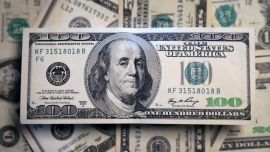Argentina’s leading presidential candidate, Javier Milei, has some unorthodox ideas about policy (he wants to abolish central banks), politics (he is libertarian) and pets (he has five cloned dogs). One of his proposals, however, is simple common sense: dollarising Argentina’s economy.
The case for dollarising is straightforward: Since 1980, by one measure, Argentina has had an average annual inflation rate of more than 200 percent. Significant portions of the economy already have moved to the use of dollars, and for that matter crypto. Why not go all the way and give the economy a stable currency, one which its politicians cannot manipulate? Argentines would find it easier to safeguard their savings, economic calculations would be easier, and foreign investors would be encouraged.
Furthermore, the peso is expected to decline by 70 percent next year, hardly a sign of a pending turnaround. For whatever reasons, Argentina’s political economy has some features that are not conducive to monetary stability and fiscal responsibility, and so further fine-tuning is unlikely to fix the problem. A drastic step is necessary.
Three Latin American economies — Panama, Ecuador and El Salvador — have already moved to explicit dollarisation. While results have varied, with Panama doing by far the best, dollarisation per se has worked out for all three: They have all moved from regimes of very high periodic inflation to relative monetary stability. None appears likely to return to its national fiat currencies anytime soon.
There are some well-known arguments against dollarisation, but most of them are based on either misunderstandings or wishful thinking about what Argentina can achieve without dollarisation.
For instance, if a country dollarises it gives up the option of earning seigniorage revenue from its own inflation, and instead turns that revenue over to the US Federal Reserve. That would be a concern if the domestic central bank were behaving responsibly. But in Argentina’s case, eliminating seigniorage revenue from inflation is exactly what dollarisation is trying to achieve.
Another argument is that what’s best for the US economy, in terms of money supply and macro policy, is not necessarily what’s best for Argentina, a distant economy only tangentially connected to the US in terms of trade. The point makes sense in the abstract. In reality, however, dollarisation is far preferable to the alternative — rampant hyperinflation.
Some have suggested that Argentina already tried dollarisation in the 1990s, by pegging its currency to the dollar. But that was a mere promise, and the promise of convertibility was broken rather spectacularly, leading to an eventual resumption of hyperinflation. In 1999, Argentina's then-president Carlos Menem’s proposal for dollarisation was rejected.
What Argentina needs is genuine dollarisation — so the government has no simple way to revert to monetary irresponsibility. Literal dollarisation, rather than a mere peg, is a credible policy.
Another concern, more significant, is that dollarisation would be a huge upfront cost to the government of Argentina: someone would have to actually come up with all the dollars to serve as currency. Keep in mind, however, that the economy of Argentina would also be acquiring a valuable asset — namely, dollars. The net cost should be zero; realistically, acquiring the dollars should prove a net positive. Argentina’s government needs to invest in the future of its citizens, and introducing a stable currency is one of the best ways to do so.
Dollarisation might involve major fiscal adjustments, if only to accumulate the dollars to make it work, and that could bring chaos to Argentina politics. That is a real risk, but it has to be weighed against the political risks of continuing hyperinflation. At least dollarisation offers some chance of eventual success.
Argentina is still one of the wealthiest nations in Latin America, but in relative terms it has been losing ground since the 1920s, when it was one of the richest nations in the world. Its education system remains sound, so matters are not hopeless, but it needs dramatically better public policy. At this point, doing nothing, or continuing on the same path, is more risky than chancing some radical reforms.
An American aside to this episode: many libertarians in the United States do not know how lucky they have it. They love to rail against the Fed, and some of them predict the demise of the dollar, perhaps through hyperinflation in the US. Then an actual libertarian candidate in another country achieves some political traction, and his most relevant policy proposal is to — elevate the status of the dollar. Perhaps the next step for American libertarians is not to rail against the US currency but to consider which other nations should dollarise.
related news
by Tyler Cowen, Bloomberg
























Comments